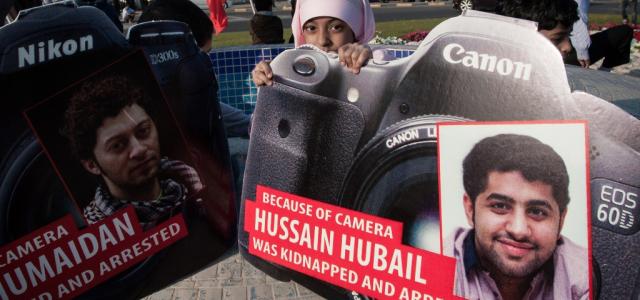Update: After this post was published, Bahrain’s Ministry of Information Affairs has partially suspended on 16 January 2017 Alwasat, the country’s only independent newspaper. See here for more details.
On 16 January 2017, Bahrain’s prosecution will try the case of journalist Nazeeha Saeed, whom the Public Prosecution Office charged with working for international media without a permit. The authorities’ accusation prompted many human rights organizations, including Americans for Democracy & Human Rights in Bahrain (ADHRB), to condemn the charges and voice concerns about Bahrain’s continuing restrictions on free press and free expression.
Nazeeha Saeed is only one of many journalists, photographers, and bloggers targeted by Bahraini authorities since the Arab Spring protests. Since 2011, government authorities have detained, harassed, or tortured journalists, including Saeed, Qasim Zainal Deen, and photographer Ahmed Humaidan, for documenting the government’s suppression of demonstrations. In 2016, Reporters without Borders ranked Bahrain 162nd out of 180 countries on its press freedom index, and at least six journalists are currently imprisoned in Bahrain. Many more individuals are detained on charges related to social media use and other forms of free speech.
Bahraini officials employ a variety of tools to intimidate and retaliate against journalists in an effort to censor criticism. The government has placed a number of arbitrary travel bans on human rights activists and journalists, including Saeed. Young journalists Mustafa Rabea, Ahmed Zainaldeen, and Hussam Suroor, among others, were subjected to enforced disappearances after their arrests for supposed “illegal assembly.” Bahraini courts have also revoked the citizenship of at least 260 people, including academics, students, religious figures, and journalists like Sayed Ahmed al-Mousawi, an internationally-renowned photographer, as a way to silence opposition leaders.
The government justifies its actions through a mixture of counterterrorism measures and legislation governing the media. The 2002 Press Law (Law 47/2002), which forms the foundation for the government’s targeting of the media, allows imprisonment for criticizing the king or religion, advocating for a change in the system of governance, instigating any crime affecting state security, and publishing false news that disrupts public security, among other actions related to free expression. The 2006 anti-terror law, known as the law on Protecting Society from Terrorist Acts – which was amended in 2013, 2014, and 2015 – has come under international criticism for its broad definition of terrorism, and the authorities have routinely used it to arrest opposition leaders and dissidents. More recently, in July 2016, the Minister of Information issued Decree 68/2016, which increased government oversight of electronic media and its authority to prosecute content producers, augmenting existing regulatory power provided under the 2002 Telecommunications Law. In August 2016, the government’s Decision 12/2016 essentially granted the Bahrain Telecommunication Regulatory Authority power to censor and block any content or websites they find objectionable.
Journalists have had little success seeking justice for abuse by government officials through legal recourse, and those who expose such mistreatment have often faced further reprisal. Sports journalist Faisal Hayyat completed a three-month prison sentence on 7 January 2017 for, according to the Ministry of Information, allegedly insulting a religious sect on Twitter, a crime under Article 38 of the 2002 Press Law. However, multiple human rights organizations, including ADHRB, are concerned that this penalty came in retaliation for his public Facebook post detailing the torture and abuse inflicted on him by Bahraini security forces in 2011. Following recommendations issued by the Bahrain Independent Commission of Inquiry (BICI), the government specifically established the Special Investigation Unit to prosecute human rights violations committed by security forces, but this new institution successfully prosecuted only one of the 138 cases referred to it by the Interior Ministry’s Office of the Ombudsman between July 2013 and June 2016. For Nazeeha Saeed, the Public Prosecution Office refused to investigate her complaint of torture during detainment in May 2011, citing “insufficient evidence” despite medical reports corroborating her story. This lack of accountability has emboldened the authorities’ abusive practices, endangering journalists like Saeed and restricting access to information in the country.
As a signatory to the International Covenant on Civil and Political Rights (ICCPR), Bahrain has a duty to protect the right to freedom of expression, which is enshrined in Article 19. Key to guaranteeing that right is protecting journalists and encouraging the development of a free press. With Nazeeha Saeed’s upcoming hearing on January 16, Bahrain has a chance to correct its growing repression of the media and begin upholding the right to freedom of expression.
Rachael Diniega is an Advocacy Intern at ADHRB.





